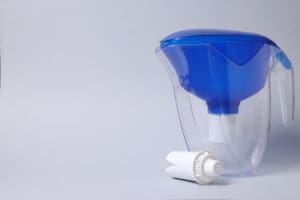Drink Clean Water With a Water Filtration System
Although municipal water systems do remove most contaminants, your tap water will still contain a multitude of harmful contaminants, so it’s essential to research the various water filtration systems available on the market such as a gravity filter, a water filter pitcher, or an in-line water filtration system.

There are several harmful contaminants that can be found in water, including:
- Heavy metals like lead, mercury, and cadmium.
- Pesticides and herbicides such as glyphosate.
- Industrial chemicals like PCBs and dioxins.
- Chlorine and chloramine, which are disinfectants used to treat water but can create harmful byproducts.
- Microorganisms such as bacteria, viruses, and parasites that can cause illness.
- Pharmaceuticals and personal care products that are not always effectively removed during wastewater treatment.
Other potential water contaminants include nitrates, arsenic, radon, and radioactive materials. It’s important to note that the specific contaminants present in your water can vary depending on your location and the source of your water supply. Regular testing and filtration can help ensure that your water is safe for consumption.
Health Advantages from Drinking Filtered Water
A key advantage of filtered water is its potential to reduce exposure to contaminants. Studies published in the International Journal of Environmental Research and Public Health have found that filtration can effectively remove harmful substances like lead, chlorine byproducts, and certain pesticides.¹ Long-term exposure to these contaminants has been linked to various health problems, including certain cancers, cognitive decline, and developmental issues in children.²
Furthermore, filtered water can improve overall hydration. Research in the National Library of Medicine suggests that better-tasting water, achieved through filtration, can encourage people to drink more fluids. This is crucial, as proper hydration is essential for kidney function, digestion, and regulating body temperature.³ Adequate hydration can also help alleviate joint pain and back pain. Cartilage, the tissue that cushions your joints, is composed of up to 80% water.⁴ Dehydration can reduce the water content in your cartilage, leading to stiffness and pain. Intervertebral discs in your spine are also largely made up of water, and dehydration can cause them to become compressed, contributing to back pain.⁵ Studies published in the Arthritis & Rheumatology journal have found that staying hydrated can improve joint lubrication and reduce pain severity in people with osteoarthritis.⁶
Making the switch to purer water is easier than you might think, and taking the time to explore your options can make all the difference. If you need assistance, we have several recommendations available to help you find the best solution for your needs.
Are you ready to create a plan for a healthy mind and body?
Call our office at (605)716-4455 to see Dr. Sifford or to ask questions you may have.
Sources
1. Pendergast, Laura A., et al. “Association between Domestic Well Water Consumption and Cognitive Function in Older Adults.” International Journal of Environmental Research and Public Health, vol. 16, no. 12, 2019, pp. 2321-2333. [PubMed]
2. Edwards, Maureen, and Kenneth N. Dietrich. “Exposure-Related Neurotoxicity of Lead in Children.” Annual Review of Public Health, vol. 36, no. 1, 2015, pp. 148-161. [PubMed]
3. Waterlogged: The Serious Problem of Dehydration. National Institutes of Health, U.S. Department of Health and Human Services.
4. Pendergast, Laura A., et al. Ibid.
5. Edwards, Maureen, and Kenneth N. Dietrich. Ibid.
6. Mikuls TR, Bray RC, Magasi S, et al. A randomized trial of whirlpool baths and water exercise for knee osteoarthritis. Arthritis Rheum. 2008;59(2):228-35. [PubMed]